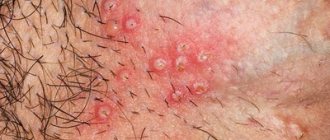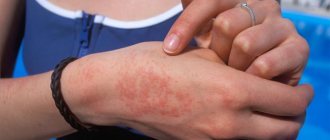Irritation in the intimate area is a common occurrence among women of any age. The most common cause of irritation is depilation. When the razor blade comes into contact with the skin, it removes not only hair, but also the top layer of skin. The skin becomes inflamed and small water pimples appear on it. Many women feel embarrassed because of this and try to get rid of the redness.
To avoid irritation in the intimate area, try to prepare the skin before depilation, for example, use a scrub. Remember one thing: until acne and redness disappear, you cannot shave.
Causes of the disease
Itchy sensations in the piquant area are provoked by irritation from external factors or internal pathological processes. At first they do not bring significant discomfort, then they become stronger. As a result of scratching, small abrasions appear on delicate skin. Through them it is much easier for pathogenic microbes to enter the body.
A single occurrence of itching should not cause panic. Recurrent discomfort is considered a pathological signal.
The probable causes of the disease are as follows:
- thrush (candida fungi);
- lack of proper hygiene;
- parasitic diseases (scabies mite, trichophytosis or microsporia);
- sexually transmitted infections (spirochete, picornaviruses, HIV genome, gonococci, chlamydia);
- hormonal imbalance (lack of estrogen);
- vaginal dysbiosis;
- reaction to artificial fabrics of underwear;
- oncological formations;
- pregnancy;
- dry mucous membranes;
- improperly performed hair removal;
- inflammatory processes;
- menopause;
- reaction to stressful situations;
- abuse of spicy foods or alcoholic drinks.
Discomfort may increase after sexual intercourse. In this case, you should pay attention to the quality of lubricants. Some women develop individual intolerance to their components. Intimate hygiene products are not least important. It is recommended to choose cleansing products with a neutral Ph.
Sometimes dryness in the intimate area is determined by your skin type. In this case, moisturizing creams and ointments will help. It is advisable to increase the amount of fluid you drink.
Overweight women are prone to irritation of the mucous surface. Discomfort may increase in hot weather due to excessive sweating. To avoid negative reactions of the body, it is recommended not to neglect water procedures and wear loose clothing.
The process of development of itching in the groin area
Most often, the factor causing the development of itching in the groin area is an inflammatory reaction.
In the inflamed area of the skin, cells of the epidermis, dermis and fatty tissue rapidly die. The immune system reacts to the process of dying skin cells and sends leukocytes to the area of inflammation.
Having reached the affected area, leukocytes begin to synthesize active compounds that regulate the inflammatory process: histamine, pro-inflammatory cytokines, prostaglandins. It is these substances in the area of inflammation that cause the sensation of itching.
- They irritate the nerve fibers and endings that penetrate the skin. Histamine causes the most severe irritation of nerves in the area of inflammation.
- They provoke swelling. The permeability of the capillary walls increases, blood plasma enters the intercellular space, as a result the skin swells, and nerve fibers are compressed by excess fluid.
- They cause hyperemia. The capillaries are compressed under the influence of pro-inflammatory substances, and blood cannot flow normally from the area of inflammation. As a result, stagnation occurs, body temperature rises, and the skin begins to itch intensely.
In rare cases, itching in the pubic part of the body develops under the influence of pathologies of the nervous system. In this case, irritation of nerve fibers occurs without the participation of the inflammatory process.
Types of itching sensations
Itching is conventionally divided into several types. They differ in degree of intensity and frequency. Increased discomfort is observed at night. The local concentration of unpleasant sensations depends on the specifics of the disease.
Itching occurs:
- weakly expressed;
- aggravated by external factors;
- strong.
If strengthening intimate hygiene and normalizing nutrition do not help cope with the problem, you need to visit a gynecologist.
Infection
Infection with the Candida fungus usually does not cause noticeable symptoms in men. This microorganism is a component of the normal microflora of human skin and mucous membranes. However, under certain conditions, Candida can behave extremely aggressively, irritating the skin and forming a whitish coating. This happens after a course of antibiotic therapy, a decrease in local immunity, or concomitant diseases (diabetes mellitus). Against the background of thrush, ulcers and cracks may appear, which only intensify the discomfort.
Genital herpes is another cause of itching in the perineum in men. The infection is transmitted sexually and causes itching, pain, and characteristic watery rashes. Infectious diseases caused by chlamydia, ureopasma, and gonococci also cause genital itching.
When to sound the alarm
It is not always clear at first glance why severe itching of the genitals appears.
Before making a diagnosis, a thorough analysis of the functioning of the reproductive organs is carried out. Associated symptoms are taken into account. The following signs indicate the development of unfavorable processes:
- pain in the lower abdomen;
- redness of the mucous surface of the labia;
- itching with white discharge;
- rashes on the surface of the skin;
- itching and burning;
- bleeding;
- increase in body temperature
Itching and discharge in women in the intimate area are characteristic of candidiasis. The vaginal secretion becomes white and cheesy. There is a specific sour smell. The mucous surface swells and turns red. Having sex becomes problematic.
With sexually transmitted diseases, purulent contents with an unpleasant odor are released from the vagina. Pimples and redness form on the skin. With herpes, blisters filled with fluid appear.
Itchy sensations with discharge and no odor are a specific sign of an allergic reaction and hormonal disorders. Discharge in this case is considered normal, since its nature can change depending on the day of the cycle.
! Reproductive tract infections can lead to infertility. They require urgent treatment.
Complications
Itchy sensations are not normal. They require proper attention. If left untreated, the disease transforms into a chronic form. The likelihood of a quick cure is reduced.
The most dangerous complications include:
- infertility;
- increased pain;
- inability to have sex;
- death;
- adnexitis;
- the possibility of transmitting the disease to another person (with HPV);
Tests for perineal diseases
As you can see, the number of diseases affecting the perineum is quite large.
How to understand which pathological process caused the unpleasant symptoms?
To do this, you need to see a doctor and undergo a full examination.
The doctor will examine you and then order tests.
Different perineal diseases are diagnosed in different ways.
A man donates blood for allergies.
If the test result is positive, the allergic attack can be controlled with medications.
And after a few days, the patient returns to the doctor to identify allergens that cause a rash on the skin of the perineum.
They are detected using skin tests.
In the future, contact with these substances is completely excluded.
If an infectious nature of the disease is suspected, skin scrapings are taken.
They are studied under a microscope.
The doctor can detect:
- dermatophytes;
- candida;
- bacterial flora.
If bacterial inflammation is suspected, a culture is performed.
It allows you to identify bacteria that provoked inflammation of the perineal skin.
In addition, their sensitivity to antibiotics is assessed.
This makes it easier for the doctor to select therapy.
PCR is used to diagnose specific infections.
A scraping is taken from the rash and sent to the laboratory.
Using molecular biological methods, the DNA of pathogens is determined.
In this way, you can diagnose any infectious diseases of the perineum, including:
- herpes;
- papillomavirus;
- syphilis;
- candidiasis, etc.
To diagnose skin diseases of the perineum, dermatoscopy and biopsy are used.
Diagnostics
Analysis of existing symptoms is not enough to make a diagnosis. Additional diagnostic methods are being carried out.
- Ultrasound examination of the pelvis helps to detect pathologies of the internal organs of the reproductive system.
- During an examination with a gynecologist, the appearance of the labia, vaginal area and cervix is assessed using a special mirror.
- Taking a biochemical test helps detect the inflammatory process in the body.
- Donating urine allows you to assess the condition of the bladder and diagnose diabetes mellitus in a timely manner.
- Determining hormone levels is necessary to identify abnormalities in the function of the endocrine system.
- The Pap test (cytological examination) determines oncological tumors.
In rare cases, discomfort in the intimate area occurs due to pathologies of a psychological nature. The solution is to take sedative medications.
Pathologies of internal organs as a factor causing itching
Some diseases indirectly cause specific itching in the perineum in men. Often a similar problem is observed in patients suffering from renal failure, diabetes or liver pathologies. In diabetics, the itching sensation is associated with elevated glucose levels. Practice shows that such a symptom occurs in patients long before diabetes is diagnosed.
Against the background of renal failure, part of the responsibility for fluid secretion is taken over by the skin layer. Nitrogen compounds, passing through the skin pores, irritate the endings of the nerves, which causes itching. In liver pathologies, the nerve endings are irritated by bile acids, resulting in discomfort.
Remedies
After identifying the cause of the discomfort, the question of how to relieve the itching is resolved. A set of measures is selected on an individual basis. Treatment will be justified only if the dosages are observed.
- For candidiasis, Miconazole, Livarol, Nystatin suppositories or Flucostat tablets are prescribed. Suppositories are administered vaginally once a day, the tablet is taken once. During pregnancy, gentle medications are used - Pimafucin or Clotrimazole.
- If there is a lack of estrogen, medications based on estriol are prescribed. There is a tablet form and suppositories.
- The development of the inflammatory process is prevented by antimicrobial drugs. At the same time, physiotherapy procedures are carried out.
- For dysbacteriosis, probiotics that improve the microflora of the genital organs are indicated: Gynoflor suppositories, Laktozhinal, Acylact and Bifidumbacterin.
- Malignant tumors are removed surgically. Additionally, chemical irradiation is performed.
- Sexually transmitted diseases are eliminated using specially targeted means. The drug is prescribed individually.
- Ointments with a moisturizing and healing effect help eliminate dryness. Bepanten cream is highly effective.
You can alleviate the condition at home. Traditional medicine methods will help with this. Among them are:
- douching with herbal infusions;
- baths of calendula, chamomile or sea salt;
- washing the labia with a solution of soda or Furalicin;
- rinsing the genitals with a decoction of mint;
- treatment of the skin surface with chlorhexidine.
If the intimate area is excessively dry, you should wash it at least 3 times a day.
Preventive measures
Following simple rules will help reduce the risk of unpleasant diseases.
- Specialized products are used to wash the genitals. Cleansing should be carried out at least 2 times a day.
- When having promiscuous sex, it is important to use condoms.
- Panty liners are changed every 3-4 hours.
- Skin cleansing products are selected taking into account the individual reactions of the body.
- A female doctor should be visited once every 6 months.
- Chronic diseases of the reproductive system require constant monitoring.
- Vitamin complexes are used to maintain the immune system in good condition.
- It is better to refrain from drinking alcoholic beverages and starchy foods.
- When choosing hygiene products, preference is given not to tampons, but to sanitary pads.
- Underwear should consist of natural, harmless materials.
- After hair removal, it is necessary to use soothing agents with natural extracts.











